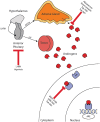Abiraterone and other novel androgen-directed strategies for the treatment of prostate cancer: a new era of hormonal therapies is born
- PMID: 22852027
- PMCID: PMC3398601
- DOI: 10.1177/1756287212452196
Abiraterone and other novel androgen-directed strategies for the treatment of prostate cancer: a new era of hormonal therapies is born
Abstract
The number of life-prolonging therapies proven effective in the treatment of metastatic castrate-resistant prostate cancer (CRPC) has been limited until recently. In the past 2 years several such therapies have come to market. In 2010, the autologous immunotherapy sipuleucel-T and the next-generation taxane cabazitaxel were approved in this setting. However, abundant evidence has shown that CRPC growth continues to be driven through androgen-dependent signaling. Both of these drugs fail to take advantage of this targetable oncogenic pathway. Potent specific inhibitors of cytochrome P450-17 have been engineered with the aim of suppressing androgen synthesis beyond that seen with the luteinizing hormone-releasing hormone agonists/antagonists. Abiraterone acetate was developed by rational design based on a pregnenolone parent structure. Its approval by the US Food and Drug Administration (FDA) was granted in 2011 based on phase III data demonstrating an overall survival advantage compared with placebo. More recently, other drugs that act along the androgen signaling pathway, such as orteronel (TAK-700), galeterone (TOK-001), enzalutamide (MDV3100) and ARN-509, have shown promise in clinical trials. Some of these are expected to gain FDA approval in the near future. Here, we review abiraterone and other novel androgen-directed therapeutic strategies for the management of advanced prostate cancer.
Keywords: abiraterone; androgen; androgen receptor; enzalutamide; galeterone; orteronel; prostate cancer.
Conflict of interest statement
Figures


Similar articles
-
Agents that target androgen synthesis in castration-resistant prostate cancer.Cancer J. 2013 Jan-Feb;19(1):34-42. doi: 10.1097/PPO.0b013e31827e0b6f. Cancer J. 2013. PMID: 23337755 Review.
-
[Prostate cancer and new hormonal treatments: mechanism of action and main clinical results].Prog Urol. 2013 Oct;23 Suppl 1:S34-43. doi: 10.1016/S1166-7087(13)70044-7. Prog Urol. 2013. PMID: 24314737 Review. French.
-
Abiraterone acetate: oral androgen biosynthesis inhibitor for treatment of castration-resistant prostate cancer.Drug Des Devel Ther. 2012;6:13-8. doi: 10.2147/DDDT.S15850. Epub 2012 Jan 16. Drug Des Devel Ther. 2012. PMID: 22291466 Free PMC article. Review.
-
Abiraterone in the treatment of metastatic castration-resistant prostate cancer.Cancer Manag Res. 2014 Jan 28;6:39-51. doi: 10.2147/CMAR.S39318. eCollection 2014. Cancer Manag Res. 2014. PMID: 24501545 Free PMC article. Review.
-
Targeting the androgen receptor in the management of castration-resistant prostate cancer: rationale, progress, and future directions.Curr Oncol. 2012 Dec;19(Suppl 3):S22-31. doi: 10.3747/co.19.1281. Curr Oncol. 2012. PMID: 23355790 Free PMC article.
Cited by
-
The role of intracrine androgen metabolism, androgen receptor and apoptosis in the survival and recurrence of prostate cancer during androgen deprivation therapy.Curr Drug Targets. 2013 Apr;14(4):420-40. doi: 10.2174/1389450111314040004. Curr Drug Targets. 2013. PMID: 23565755 Free PMC article. Review.
-
Hedgehog signaling in prostate cancer and its therapeutic implication.Int J Mol Sci. 2013 Jul 4;14(7):13979-4007. doi: 10.3390/ijms140713979. Int J Mol Sci. 2013. PMID: 23880852 Free PMC article. Review.
-
From bench to bedside: bipolar androgen therapy in a pilot clinical study.Asian J Androl. 2015 Sep-Oct;17(5):767-8. doi: 10.4103/1008-682X.151390. Asian J Androl. 2015. PMID: 25814159 Free PMC article.
-
Progressing nanotechnology to improve targeted cancer treatment: overcoming hurdles in its clinical implementation.Mol Cancer. 2023 Oct 9;22(1):169. doi: 10.1186/s12943-023-01865-0. Mol Cancer. 2023. PMID: 37814270 Free PMC article. Review.
-
Cancer-Associated Fibroblasts Modify the Response of Prostate Cancer Cells to Androgen and Anti-Androgens in Three-Dimensional Spheroid Culture.Int J Mol Sci. 2016 Sep 1;17(9):1458. doi: 10.3390/ijms17091458. Int J Mol Sci. 2016. PMID: 27598125 Free PMC article.
References
-
- Agus D., Stadler W., Shevrin L., Hart G., MacVicar O., Hamid J., et al. (2011) Safety, efficacy, and pharmacodynamics of the investigational agent TAK-700 in meta-static castration-resistant prostate cancer (mCRPC): updated data from a phase I/II study. J Clin Oncol 29(Suppl.): abstract 4531
-
- Attard G., Reid A., Auchus R., Hughes B., Cassidy A., Thompson E., et al. (2012) Clinical and biochemical consequences of CYP17A1 inhibition with abiraterone given with and without exogenous glucocorticoids in castrate men with advanced prostate cancer. J Clin Endocrinol Metab 97: 507–516 - PubMed
-
- Attard G., Reid A., Olmos D., De Bono J. (2009a) Antitumor activity with CYP17 blockade indicates that castration-resistant prostate cancer frequently remains hormone driven. Cancer Res 69: 4937–4940 - PubMed
-
- Attard G., Reid A., Yap T., Raynaud F., Dowsett M., Settatree S., et al. (2008) Phase I clinical trial of a selective inhibitor of CYP17, abiraterone acetate, confirms that castration-resistant prostate cancer commonly remains hormone driven. J Clin Oncol 26: 4563–4571 - PubMed
LinkOut - more resources
Full Text Sources
Other Literature Sources
Miscellaneous

